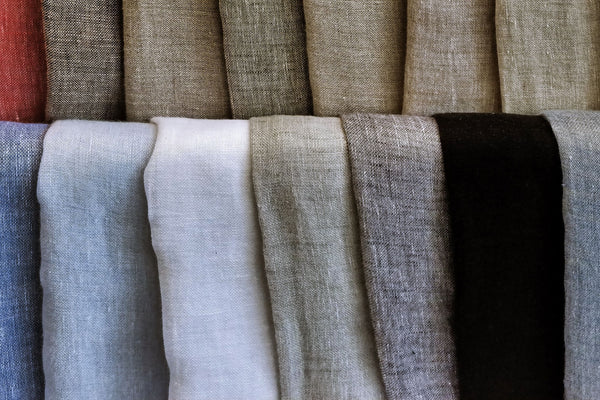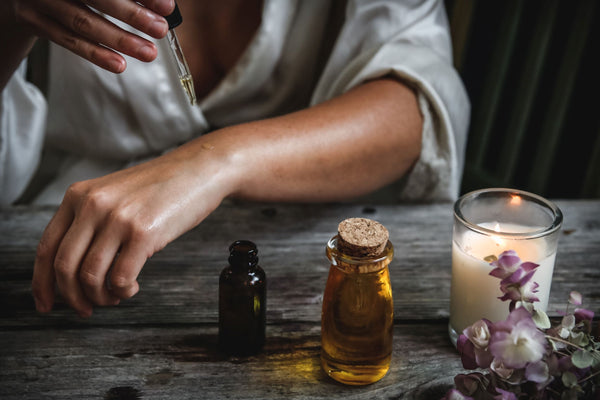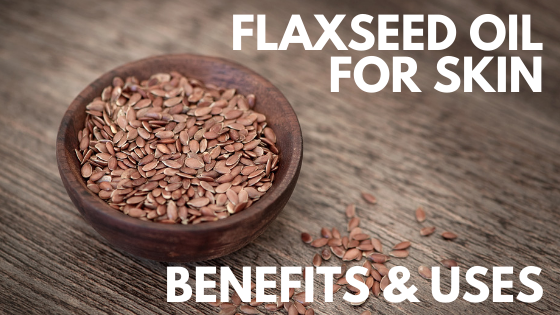We have all heard of the benefits of flaxseed oil for our health. It's now a staple of a healthy diet, a "magic ingredient" you'll find in amazing smoothie combinations or salad dressings.
But do you only get the benefits of this ingredient when digested? Or is there more to it? It turns out that flaxseed oil has additional benefits, and some are great for the skin.

What is Flaxseed Oil?
Flaxseed oil (also called linseed oil) is made from the seeds of the flax or linseed plant. As you can assume, flaxseed oil is made by grinding flaxseeds and pressing them so hard that they release their natural oil.
If something about it sounds vaguely familiar, but you can't quite put your finger on it, we don't blame you. Let us ask you this: does the word "linen" mean anything to you?
We're sure it does! That's how linen was created and got its name - all linen is made of linseed. Pretty impressive, right?
Since times immemorial, humans have been growing, domesticating, and harvesting linseed, turning it into all sorts of useful things. Linseed, or flax, is a blue flowering plant domestic to the cooler regions of the world and has been historically grown in Germany, France, Switzerland, and the prairies of Canada. It was also known to people in Egypt, and the Middle East, going as far as India and China.

Besides making linen pants, shirts, bedsheets, underwear, and table linen, linseed was also used as a food additive in the form of flaxseeds and oil. It's not exactly clear when linseed got its second name, flax, but it's speculated it comes from the unspun fibers of the plant, which were called "flax." And from there on, people began referring to it as flaxseed.
Being rich in Omega-3 fatty acids, this ingredient is widely known and appreciated for its many benefits to our health, such as reducing inflammation, boosting our immune system, protecting our heart, slowing down the growth of cancer, and more.
Flaxseed Oil for the Skin
But what about applying flaxseed oil directly to our skin? Does it have any benefits when used topically, or should we just ingest it through food?
If you're consuming flaxseeds or flaxseed oil to improve the look and condition of your skin, ingesting it may not be the best way. In fact, applying it directly over the skin may be a lot more effective than taking flaxseed oil supplements.
Note: Before we proceed, remember that flaxseed can easily spoil if not protected properly. Store it in amber or other darkly-colored glass bottles or containers. Keep it in a cool and dark place.

Flaxseed Oil is Great for Your Face
The high concentration of Omega-3 gives flaxseed oil its anti-inflammatory properties. This means that it's also efficient at soothing dry skin and can also help you get rid of acne or prevent it.
This ingredient ticks nearly all the boxes when it comes to benefits for the skin on your face. It's a good moisturizer because it locks the water molecules close to your skin, keeping it hydrated. Additionally, the precious Omega-3 refreshes your skin cells and rebalances any discoloration, making it firmer and more elastic, and providing you with clearer-looking skin overall.
It's so simple to use. Just pour some on your skin and rub it in. Massaging your face with this oil a couple of times a day will also make your moisturizers and skincare cream a lot more efficient.
Finally, flaxseed oil can be used as a natural and non-irritating makeup remover. You know the drill - pour several drops on a piece of cotton, and dab away. There's a reason it's used to dilute oil paints instead of turpentine. It doesn't have that terrible smell, and it just works.
Flaxseed Oil Smooths Out Wrinkles
Apart from maintaining our skin's health in general, this oil can also be used to reduce the appearance of premature aging.
Our skin is largely made out of collagen, which is a protein. And logically, our skin needs more protein to maintain itself. Being rich in Omega-3 fatty acids, this ingredient is ideal for its purpose. When applied topically, Omega-3 helps the skin repair itself, which can smoothen out wrinkles, treat dark circles, and iron out any other irregularities.
All you need is some fresh flaxseed oil. Take one tablespoon and rub it over any lines you want to see softened up. You can begin in the morning and do it up to four times a day. If you don't have a bottle of this substance lying around, you can use flaxseed oil supplements. These usually come in the form of soft, plastic capsules. You will need to take a capsule, cut a small opening around its top, and squeeze out the oil on your hands or over the desired area.
Slowly but surely, the oil will make your skin healthier and more elastic, improving its tone and texture. And the wrinkles? Well, chances are you'll barely notice them.

This Substance Can Alleviate Eczema
Eczema is one of the most common skin disorders, resulting in dry, flaky, unbearably itchy, and irritated skin. Life with eczema is especially challenging. It's not just about the itching - you also have to follow rules to avoid irritating your eczema-prone skin.
This is where flaxseed oil enters the picture, especially when applied topically. The Omega-3 fatty acid is well-suited for the epidermal cells of our skin. These skin cells line the uppermost layer of our skin and possess the ability to convert essential fatty acids from flaxseed oil into substances called prostaglandins. Prostaglandins are hormone-like substances that regulate the maintenance, growth, and renewal of the tissues in our bodies - they affect our skin health, too.
This means applying flaxseed oil topically over eczema-prone skin can boost its natural defense capabilities. This will result in less irritation, dryness, and flakiness. It is no wonder that this ingredient is commonly used in moisturizers, lotions, sunscreens, and other skincare products.
Flaxseed Can Also Help With Psoriasis
Psoriasis is similar to eczema - but worse. This skin condition is largely caused by the immune system, which mistakes healthy skin cells for foreign bodies and begins attacking them. This results in redness, unbearable itching, and raised, scaly patches over the affected areas of the skin.
Psoriasis typically appears on the outer side of the elbows, the knees, the neck, or the scalp, although it cannot be excluded in any other locations. It can be very unpleasant to live with and can cause persistent burning and stinging sensations.
While there is no cure, you can use many habits, substances, and remedies to alleviate it.
According to scientists, people who experience psoriasis have a significantly greater number of inflammatory compounds in their bodies and skin. Additionally, the appearance of psoriasis has been connected to a deficiency in several substances that maintain our skin's health, such as a lack of Omega-3 and a deficiency in other EFAs (essential fatty acids).
Rubbing it directly over the skin, especially in people with psoriasis, can offer the skin the essential fatty acids it may lack. Additionally, these substances, along with the Omega-3, can act as inhibitors to the inflammatory processes on the skin, which may reduce the severity of psoriasis and the frequency of its symptoms.

Flaxseed Oil is Great for Your Hair and Scalp
If you happen to be dealing with dandruff or an itchy scalp, flaxseed oil can be of assistance.
Just pour some oil into your hands, rub them together, and massage your head. This will help it penetrate the skin on your scalp. If it can relieve itchiness and flakiness from eczema and other types of dermatitis, trust us - it can remove itching from dandruff, too.
An additional benefit here is, of course, the lustrous shine your hair will receive! By helping your head regain its moisture, it ensures you grow healthy, strong, and hydrated hair. Your hair follicles will love this oil and its high content of Omega-3.
Finally, we mentioned that flaxseed is often used in oil paint, which helps keep the pigment together. Well, guess what? It can do the same with your hair. This oil will make it shinier, but it will also hold it together. So, if you skip commercial styling gels, give flaxseed oil a shot. It provides both nutrition and style at the same time!
It's Also Good For Your Body
Surely, an ingredient this beneficial for the face and common skin disorders will also benefit the body, right? Yep, you guessed right.
No need to limit this oil to sorting out wrinkles or alleviating symptoms such as irritation and excessive skin dryness. Those same anti-inflammatory benefits can be readily harnessed if you start using it as a body wash. Some people even use it as natural, DIY sunscreen. However, be aware that flaxseed oil will only offer light protection against the sun's harmful UVA and UVB radiation. If you truly want to protect your skin from the sun, opt for a broad-spectrum, quality sunscreen with a high SPF.
For the most part, flaxseed is very safe. Barring a small portion of the population who might have allergies to linen, this skincare ingredient is harmless. Use it as a body lotion - it will make your skin hydrated, elastic, and silky smooth.

Another use of flaxseed is as a DIY hydrating body scrub. It's super easy to prepare this scrub. Just take a handful of flax seeds, grind them up (but not too much, since this is a scrub), and then add oil to the mixture. You can combine these ground-up flax seeds with flaxseed oil, coconut oil, olive oil, argan oil, and more. The choice is yours.
Then, of course, mix it well. When it's ready, you can try it out!
A Note on Patch Tests
As always, you should ensure that your skin can handle flaxseed. Just because something is natural, it doesn't mean that it's harmless.
A common example of this is fresh lemon juice. While it's safe to drink and has many benefits for combatting acne, freshly squeezed lemon juice can sometimes burn your skin surface - especially those with sensitive skin types.
A very small percentage of the population is allergic to flaxseeds, linen, or flaxseed oil, but the problem is that you can't know before you try.
It's always best to perform a patch test first. Patch tests are very simple. Just take a small amount of the ingredient you want to test, and apply it over a small "patch" of skin.
Then, watch how your skin reacts. Some people may experience itching, redness, sensations of burning, or other unpleasant side effects within minutes (called type 1 allergy). But in others, the skin will take hours to manifest its allergic or irritated reaction to the ingredient you're testing.
Because of this fluidity of reaction time, most dermatologists and skincare experts recommend waiting for at least 24 - 48 hours after applying the ingredient. Type 4 allergic reactions may take two to even five days to appear.

If you experience no negative reactions, you can continue using the ingredient in question.
However, if your skin reacts very negatively to the substance, ingredient, or product you're testing, stop the test immediately and wash off the affected area of the skin. Do not use that ingredient or product because it will damage your skin.
If your skin doesn't like it, that's the end of it. And when it comes to all matters of skincare, your skin is king.
General Health Benefits of Flaxseed Oil
There are other general health benefits of flaxseed oil.
As you know, skincare is not exclusively external - meaning that what we let inside our bodies carries a great significance for the condition of our skin too.
Consuming some ingredients will make our skin better and more resilient. One notable example of this is antioxidants, such as vitamin E. Antioxidants protect our bodies from free radicals and keep our skin clear and young looking.
The reverse is also true. Subsisting on unhealthy diets can wreak havoc on your skin, even if you keep it clean and moisturized. If you wish to keep your skin healthy and clear, avoid acne-causing foods, and perhaps experiment with a dairy-free diet. Additionally, you might want to replace smoking cigarettes with vaping and become more mindful about your daily intake of coffee. You can also take vitamin supplements to help.

Getting enough sleep and being in a good place, mentally speaking, is also very important to achieve good-looking skin. Stress can often cause acne; sometimes, we can mitigate it by sleeping better, investing in amazing skincare products, changing certain lifestyle habits, exercising, or experimenting with meditation, yoga, and other psychological tools to reduce stress.
All of the above can worsen your health, which disrupts your skin's maintenance cycles, and can contribute to the appearance of acne and clogged pores. Here is where flaxseed enters the picture. Its high concentrations of Omega-3 make it excellent for our skin, reducing inflammation and harmonizing our digestion. But that's only part of it.
Here are some of the most important flaxseed oil benefits for our health and skin.
Flaxseed Oil is Super Rich in Omega-3 Fatty Acids
One tablespoon of flaxseed oil (15 ml) is thought to contain 7,196 mg of Omega-3, which is very impressive compared to most other sources. Flaxseed contains Alpha-linolenic Acid (ALA), a good source of "useful" Omega-3 fatty acid.
Our bodies have a much easier time converting Alpha-linolenic Acid into the biologically active forms of Omega-3, like Docosahexaenoic acid (DHA) and Eicosapentaenoic acid (EPA). This makes flaxseed oil one of the best sources of Omega-3 in existence. Omega-3 fatty acids are essential for human health and have been linked to reduced inflammation, keeping our brain young, and improving our heart's health.

It May Reduce Cancer Growth
Flaxseed oil is showing promising results in treating cancer as well. Although the current research is still limited to animal studies, preliminary studies, and test-tube experiments, several studies show evidence that flaxseed oil may slow the proliferation of cancer cells.
For example, in a study where mice were given 0.3 ml of flaxseed oil for 40 days, it was discovered that it prevented the growth of lung cancer and associated tumors. Another animal study seems to confirm these findings, proving that administering flaxseed oil seemingly blocked the appearance of colon cancer in rats. Test-tube studies have produced similar discoveries, with some showing that a steady intake of flaxseed oil reduced the growth of breast cancer cells.
More research remains to be done, but these early indications are very promising.
Flaxseed Oil Protects the Heart
It's not just all about skin conditions. Several studies have discovered that flaxseed oil could be good for our hearts. Results show that taking small amounts of flaxseed oil can lower blood pressure, and other studies show that flaxseed oil improves the elasticity of our blood vessels, reducing the chance of heart disease. So far, scientists believe that this is directly connected to the high amount of biologically active Omega-3 in flaxseed oil.
Additionally, research has indicated that Omega-3 can improve the heart's health in other ways, such as reducing inflammation and balancing blood pressure.
Final Thoughts
This is just a small but important selection of the health benefits of this oil. We couldn't talk about all the health boons in this article. Flaxseed oil is not only good for your health but also excellent for your skin.
References
Omega-3 Fatty Acids and Inflammatory Processes
Flaxseed oil increases the plasma concentrations of cardioprotective (n-3) fatty acids in humans
Omega-3 fatty acids and cardiovascular disease
The growth of human breast tumors
The influence of arterial compliance on diastolic blood pressure
Is Flaxseed Oil or Fish Oil the Better Choice?
Flax seed oil inhibits metastatic melanoma
Cancer chemopreventive potential of the Egyptian flaxseed oil
Effect of Omega-3 fatty acids on blood pressure
This information is meant to supplement, not replace advice from your doctor or healthcare provider and is not meant to cover all possible uses, precautions, interactions or adverse effects. This information may not fit your specific health circumstances, and its goal is to offer a general view of the subject. In case you are suffering from a severe case of acne, you should consult with a dermatologist or a certified medical professional.








